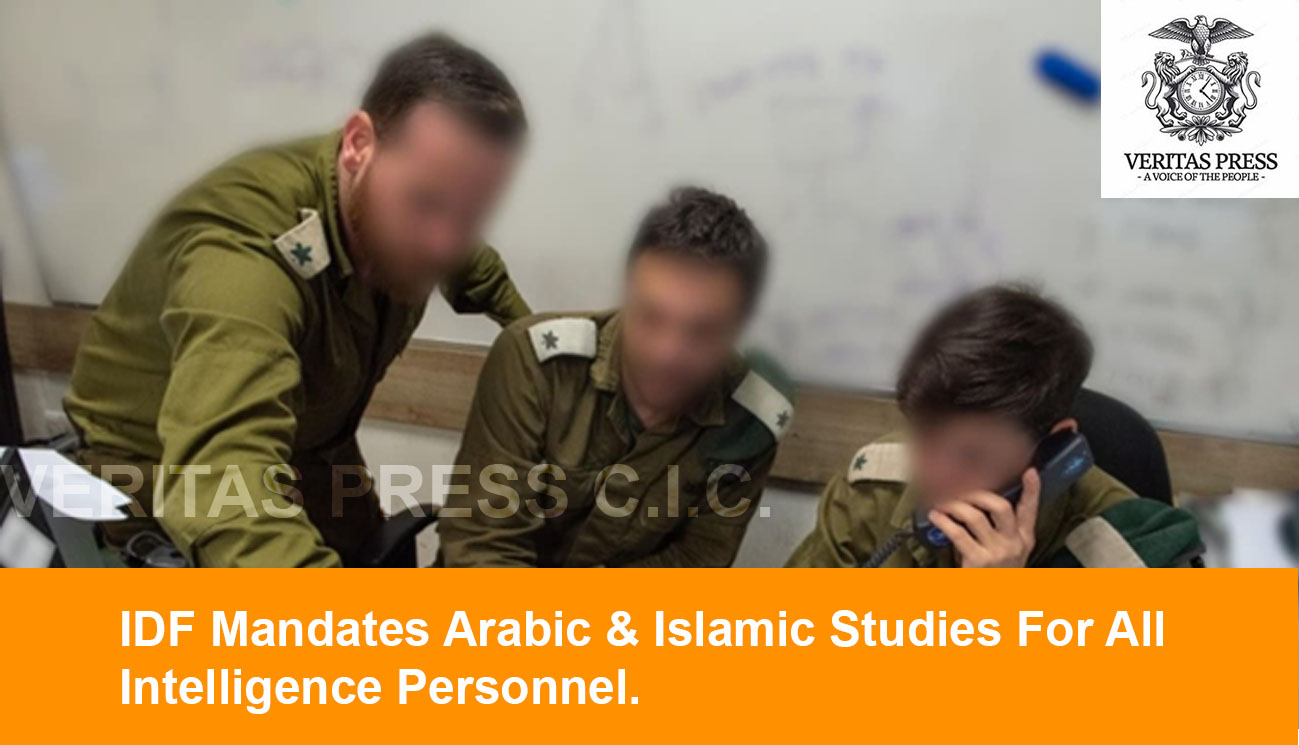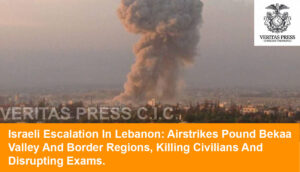Press Release: Veritas Press C.I.C.
Author: Kamran Faqir
Article Date Published: 15 July 2025 at 12:58 GMT
Category: Middle East | Palestine-Gaza | US-Israel At War
Source(s): Veritas Press C.I.C. | Multi News Agencies
Business Ads

In response to significant intelligence failures on October 7, 2023, the Israel Defense Forces (IDF) Intelligence Directorate (Aman) is undertaking a comprehensive restructuring of its human and cultural intelligence capacities. Under the leadership of Maj. Gen. Shlomi Binder, Aman has now made proficiency in Arabic and Islamic cultural studies compulsory for every intelligence soldier and officer, even those in technical roles like cyber and signals intelligence.
Key Elements of the Reform
Universal Training Mandate
All intelligence personnel, from cyber specialists in Unit 8200 to field intelligence soldiers, will undergo structured training in Arabic language and Islamic culture.
By the end of next year:
100% of Aman personnel will complete Islamic studies courses.
50% will receive formal Arabic language instruction, up significantly from previous years.
New Arabic & Islam Department
A dedicated unit is being established within Aman to oversee this curriculum.
It will recruit instructors from relevant communities and include dialect training, specifically Houthi (Yemeni) and Iraqi Arabic, to address regional intelligence gaps.
Training Pipeline Integration
Arabic and Islamic cultural education will begin during pre-military coding phases and continue through basic training, officer courses, and advanced leadership programs.
The Tel‑M section, formerly active in promoting Arabic in civilian schools, will be revived under the Unit 8200 umbrella to deepen integration across educational levels.
Goals & Strategic Intent:
Analytical Empowerment: Fluency in Arabic and knowledge of Islamic culture is intended to sharpen analytical skills, enabling more nuanced interpretation of communications and motivations. “We cannot turn Israeli intelligence personnel into Arab kids from the village, but through language and culture, we can instil in them doubt and deep observation,” a senior Aman officer reflected.
Cultural Fluency as a Strategic Asset: These reforms aim to prevent the blind spots that contributed to the Hamas attack by ensuring intelligence officers understand not just what is being said, but how and why it is said.
Regional Dialect Competence: With the IDF increasingly active across multiple fronts, Gaza, Lebanon, Iraq, and Yemen, mastery of locally diverse Arabic forms (e.g., Iraqi, Yemeni/Houthi dialects) is critical for accurate intelligence.
Addressing Current Gaps:
The new focus on dialects, especially Yemeni Arabic spoken by Yemen’s Houthi movement, is a direct response to operational challenges. Analysts have struggled to interpret communications encoded by the effects of qat, a plant chewed socially in Yemen that can distort speech, making voice interception and analysis extremely complex.
Courses taught by native-speaking instructors and teachers from relevant communities aim to close this gap and ensure intelligence fully captures contextual subtleties.
Context & Ongoing Reforms:
Shift Toward Human & Open-Source Intelligence
A February 2025 IDF “SitRep” confirmed a broader reorientation of Aman’s priorities: increased use of human intelligence (HUMINT) and open-source signals, strengthened cross-source integration (cyber, SIGINT, HUMINT), and expanded teams like the Devil’s Advocate unit to challenge and verify intelligence assumptions.
Strategic Continuity in Language Education
These reforms are the latest iteration of a longstanding push by Israeli intelligence to improve Arabic proficiency. Efforts date back decades, through programs like Shif’at (1986–2001) and Tel‑M, but have often been underfunded or deprioritised until recent shifts prompted by real-world security crises.
Holistic Approach
The IDF’s renewed emphasis on human capabilities and cultural literacy aligns with recent Israeli media reports:
Ynet notes that technology cannot replace human expertise, and that thousands of intelligence trainees are already being taught Arabic dialects and cultural context, including Yemeni Arabic and Farsi, and even phrases drawn from intercepted real-time communications.
Expert & Public Reactions:
Internal Endorsement: Many within Israel’s defence community view these reforms as essential to modern intelligence operations, particularly in preventing surprise attacks like October 7 and improving situational awareness across multiple fronts.
Analyst Backing: Foreign policy analysts highlight this approach as part of a global trend: successful intelligence increasingly requires linguistic and cultural literacy. The IDF’s systematic investment now aligns with broader best practices.
Conclusion: Weaponising Culture for War.
While the IDF’s push to integrate Arabic language and Islamic cultural studies into its intelligence curriculum is being publicly framed as a corrective measure following the October 7 intelligence failure, a deeper examination reveals troubling implications. Beneath the surface of linguistic proficiency and cultural understanding lies a far more calculated ambition: the systematic weaponisation of religion and identity for strategic gain.
This is not simply a pragmatic shift toward cultural competence; it is an attempt to co-opt Islam as an intelligence asset, turning religious knowledge into a surveillance and operational tool. The move reframes the study of Islam not as a pathway to coexistence or understanding, but as a military instrument. Soldiers are not being taught Arabic or Islam to foster diplomacy or empathy; they are being trained to infiltrate, mimic, manipulate, and ultimately dominate.
In this context, the IDF’s directive must be seen as part of a broader campaign to control and distort Arab and Muslim narratives. The expansion of specialised dialect training, the recruitment of instructors from Arab communities, and the institutionalisation of Islamic studies within intelligence pipelines all point toward a propaganda infrastructure disguised as education. This risks not only reducing complex cultures to threat matrices, but also manufacturing a narrative lens through which Islam is viewed exclusively as a tactical battlefield.
Moreover, it raises critical ethical concerns. Intelligence officers trained to understand Islamic beliefs and cultural patterns are just as likely to deploy that knowledge in psychological operations, targeted disinformation campaigns, or narrative warfare as they are in translation or analysis. As recent Israeli media reports reveal, intercepted communications are already being repackaged into culturally tailored narratives aimed at undermining Palestinian resistance and sowing confusion among regional adversaries. This is not education, it is exploitation.
In essence, the IDF is not merely responding to past failures. It is laying the groundwork for a future where religion itself becomes a battlefield, where Islamic culture is instrumentalised and demonised as both target and tool. The stated goal of fluency and familiarity is not neutrality but dominance: cultural literacy as a means of deepening occupation, accelerating surveillance, and sustaining the ideological war against Palestinians and other regional actors.
By embedding Islamic studies within military intelligence and promoting it under the guise of reform, the Israeli military risks further entrenching a system where religious identity is mined for military advantage. This policy not only dehumanises the very cultures it seeks to “understand” but actively promotes the use of misinformation and selective interpretation of religion to justify and perpetuate violent policies.
Ultimately, this is not about avoiding another October 7. It is about controlling the narrative before the next one and ensuring that language, faith, and identity are no longer shields for the oppressed, but weapons in the hands of the occupier.
What Comes Next?
Full implementation of the new training programs across all ranks and roles by the end of 2025.
Monitoring of early operational impacts, such as improved signal interpretation in Yemeni/Houthi contexts.
Continued alignment with broader intelligence restructuring: enhanced HUMINT, cross-source integration, and improved critical-thinking units within Aman.



























